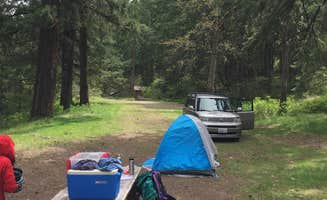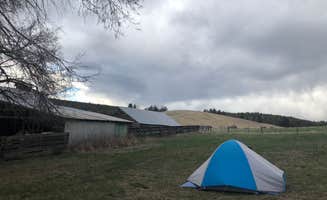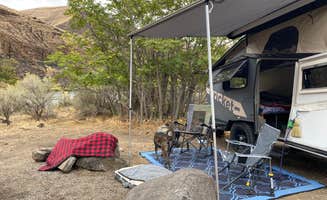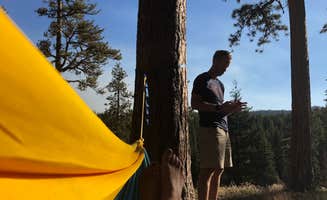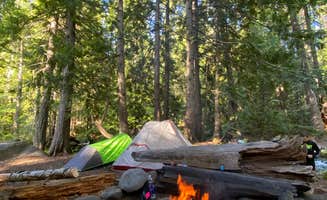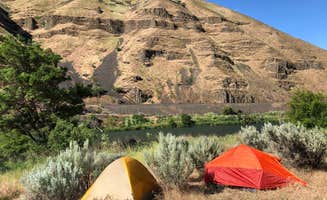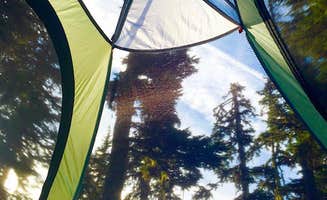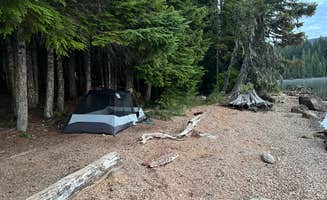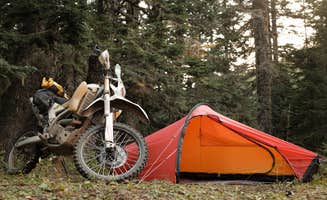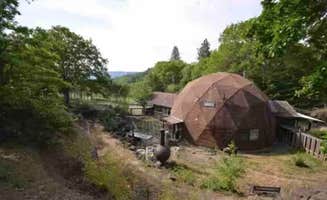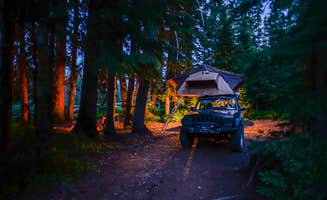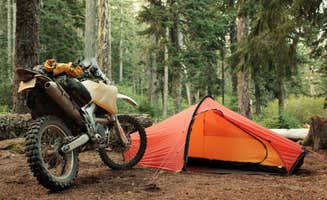Tent camping options around Tygh Valley, Oregon span across Mount Hood National Forest's eastern edge and the Deschutes River corridor. This high desert transition zone ranges from 1,300 to 3,500 feet in elevation with summer temperatures often reaching 85-95°F during day and dropping to 45-55°F at night. Most camping sites throughout this region require visitors to pack in their own water supplies as natural sources are limited and seasonal.
What to do
Fishing access: 20 miles from town: At Oak Springs Campground, riverside tent camping provides direct fishing access. "Awesome spot on the river, clean spots, with fire rings and picnic tables. Spots are located all along the BLM road and are marked. Easy access to the river for fishing," notes camper SpentBrassOffroad B.
Mountain biking: Multiple trail systems: The network of forest roads and trails surrounding Pebble Ford Campground offers excellent mountain biking opportunities. "Close to trails for hiking or biking," confirms Dory K., while another visitor adds, "Love this campground. Very quiet and even has a few dispersed camp spots outside the main area."
Wildlife viewing: Dawn and dusk optimal: Several camping areas provide excellent wildlife viewing. At Carbon Farm Yard, camper Stephanie Z. describes the property as "spacious and quiet. There is tons and tons of land to explore and lots of animals and wildlife to view. Lots of space for kids to run around and safely explore."
What campers like
Creekside camping: Natural white noise: Campers frequently mention the appeal of sleeping beside moving water. At Bonney Crossing Campground, Cheryl P. shares, "I absolutely love this place. The campsite is clean with no over growth. Sleeping next to the water is calming and the hikes are top notch."
Stargazing: Minimal light pollution: The eastern side of Mount Hood National Forest offers exceptional night sky viewing. Kevin L. describes Bonney Crossing as a place to "Hear and see the water from half the sites," making it ideal for combined water-and-star experiences.
Remote locations: Vehicle considerations: Many appreciate the seclusion, though it comes with challenges. At Keeps Mill Campground, Tristan T. cautions, "You MUST have a high-clearance 4x4. The worst stretch of road is narrow with steep wall on one side and steep drop on the other. You will not be able to turn around."
What you should know
Road conditions: Seasonal challenges: Many campgrounds require careful navigation. For Badger Lake Campground, Jason P. advises, "It is very beautiful but when they say it's a rough road it is a very very rough and rocky road I barely made it in my four-wheel drive and there's a very skinny downhill with a cliff with lots of jump rocks."
Water availability: Limited sources: Most Tygh Valley area tent camping requires bringing your own water. Scott B. mentions Bonney Crossing "is 'primitive' so you must bring your own potable water. Site does have an accessible pit toilet."
Wind patterns: Afternoon gusts common: The canyon areas can experience significant wind. At Macks Canyon Recreation Site, Sarah S. reports, "The only negative is that it can get super windy. At one point we were frantically trying to get our awning down from the Cricket and things were flying everywhere. The wind lasted about an hour and then things calmed down again."
Tips for camping with families
Creek exploration: Natural play areas: Children especially enjoy the water features at campgrounds. At Badger Lake Campground, Lisa K. suggests, "Bring a kayak or SUP to enjoy the lake. The campground was very peaceful, especially near the creek."
Hiking options: Badger Creek Trail system: Multiple family-friendly trails connect camping areas. Scott B. notes that at Bonney Crossing, "Kids loved spending time exploring the creek and cooling off in it."
Spacious sites: Room for activities: Barlow Crossing offers particularly family-friendly tent sites. Jordan C. describes it as a "Great spot! Super easy to drive in, with lots of options for spots... we parked at the top of the hill and walked about 5 min down to our spot right on the creek, however there were many spots that you could drive right up to."
Tips from RVers
Site selection: Size restrictions: RV access is limited at most Tygh Valley tent camping areas. At Little Badger Campground, Cory W. cautions, "My major complaint is that you need a large truck to safely get in and out of the campsite. I drove my sedan, and though I made it, my car bottomed out multiple times and I got a flat tire."
Accessibility timing: Seasonal considerations: Many campgrounds close entirely or become inaccessible to larger vehicles after early autumn. At Badger Lake Campground, Michael P. suggests, "I preferred camping away from the lake since I had the whole place to myself," highlighting the additional privacy available during shoulder seasons.
Road preparation: Washboard conditions: Approach roads require careful driving. James W. notes about Macks Canyon Recreation Site, "I have never experienced a washboard road as bad as this was for 6-7 miles. I thought the doors were going to blow off the truck. Not an exaggeration. Usually you can adjust speed to plane the wash. Not this time."


